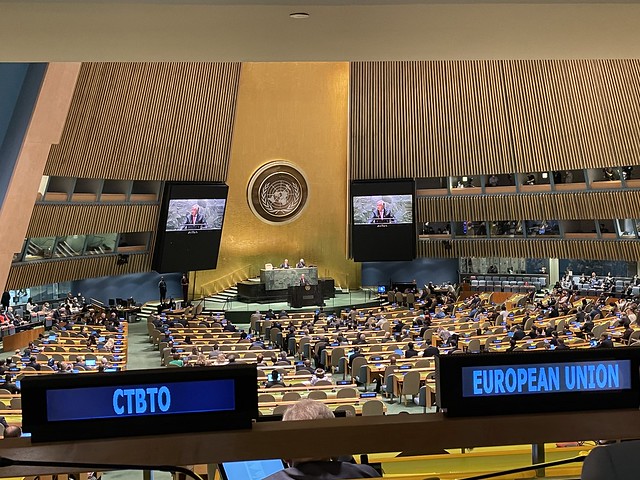CTBTO Head hails Treaty "A Success Story" at NPT Review Conference
The Comprehensive Nuclear-Test-Ban Treaty (CTBT) has been called a success story by Executive Secretary Robert Floyd for creating and sustaining a norm against nuclear testing so powerful that fewer than a dozen tests have been conducted since its adoption in 1996.
Spea king to delegates at the Tenth Review Conference of the Parties to the Treaty on the Non-Proliferation of Nuclear Weapons (NPT RevCon) on 5 August, Floyd highlighted the complementarity of the two Treaties in ridding the world of nuclear weapons, noting, “We rely on the multilateral treaties and verification regimes that underpin the nuclear disarmament and non-proliferation architecture. The NPT and the CTBT are instrumental parts of this peace and security architecture.”
king to delegates at the Tenth Review Conference of the Parties to the Treaty on the Non-Proliferation of Nuclear Weapons (NPT RevCon) on 5 August, Floyd highlighted the complementarity of the two Treaties in ridding the world of nuclear weapons, noting, “We rely on the multilateral treaties and verification regimes that underpin the nuclear disarmament and non-proliferation architecture. The NPT and the CTBT are instrumental parts of this peace and security architecture.”
Floyd also took the opportunity to congratulate the States that have ratified the Treaty since the last Conference in 2015: Comoros, Cuba, Dominica, Eswatini, The Gambia, Myanmar, Thailand, Timor-Leste, Tuvalu, and Zimbabwe, saying that each ratification helps strengthen the global norm against nuclear testing.
During the first week of the NPT RevCon, twice postponed due to the global health crisis, the Executive Secretary also took part in a 4 August side event, organised by the European Union, examining how the CTBT supports the three pillars of the NPT and how the EU contributes to both treaties.
The host of the hybrid meeting, the EU Special Envoy for Non-proliferation and Disarmament, Marjolijn van Deelen said, “promoting the universalisation of the CTBT and its entry into force is a political imperative for the EU.” She added that for the EU, “the CTBT really is the best guarantee against nuclear proliferation and against a nuclear arms race, and it’s multilateralism at its best.”
Over the course of his week-long trip to New York, Floyd held in-person and virtual meetings with representatives from Argentina, Canada, China, Dominica, Equatorial Guinea, The Gambia, Indonesia, Japan, Lao DPR, Lebanon, Mexico, Solomon Islands, Sri Lanka, Sweden, Timor-Leste, Tuvalu, the United Arab Emirates, the United Kingdom, and the United States of America.
The CTBTO head also met with international and regional organizations to discuss support for the CTBT, including the United Nations Office for Disarmament Affairs (UNODA) and the African Commission on Nuclear Energy (AFCONE).
The Treaty on the Non-Proliferation of Nuclear Weapons (NPT) is a landmark international treaty which aims to prevent the proliferation of nuclear weapons, promote co-operation in the peaceful uses of nuclear energy, and achieve the goal of nuclear disarmament. Since its entry into force in 1970, the NPT has become the cornerstone of the global nuclear non-proliferation regime with 191 States parties to the Treaty, including the five nuclear-weapon States, making the NPT the most widely adhered to multilateral disarmament agreement. The Treaty envisages a review of the operation of the Treaty every five years.
15 Aug 2022

